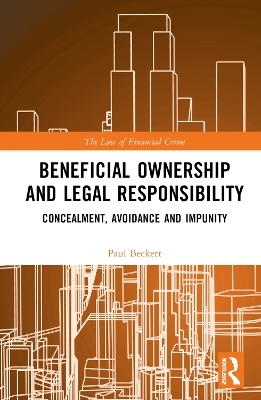
Beneficial Ownership and Legal Responsibility
Concealment, Avoidance and Impunity
Seiten
2024
Routledge (Verlag)
978-1-032-53760-3 (ISBN)
Routledge (Verlag)
978-1-032-53760-3 (ISBN)
This book explores the connection between ownership, on one hand, and immunity from legal responsibility, on the other. It presents a definition of the concept of beneficial ownership, the reasons for its concealment, and failures in international legal structures and arrangements.
Globally, states confront complex crimes, such as corruption, tax evasion, doctrinal fanaticism, slave trafficking, terrorism and, war. At the personal level, men and women may seek to escape their creditors, to disinherit unwanted heirs, to cheat divorced partners, and to appear straightforward when this is not the case. The response of politicians and regulators has been a global state initiative to identify beneficial owners via public registers to promote transparency and accountability. Yet, at the same time, there is an equally powerful global and personal counter-initiative to promote beneficial ownership avoidance. Where there is no owner, there is no accountability.
This book examines what “ownership” means in legal terms across multiple legal systems and explains why singling out ownership as being pivotal to state and personal accountability is a strategy both flawed and disingenuous. It is argued that an apparent lack of political will coupled with shape-shifting definitions of ownership have resulted in tokenism. Particular attention is paid to those “orphan” structures which have evolved from standard models, or which have been designed for the purpose in each case of facilitating ownership concealment and avoidance. The author explains how the virtual world of the blockchain, crypto-assets and cryptocurrency, and virtual entities such as the Decentralised Autonomous Organisations (DAOs), all of which elude legal classification, have opened a new world of possibilities.
Applicable across all jurisdictions and legal systems, the book will be a valuable resource for academics, researchers, and policy-makers working in the areas of financial crime, regulation, compliance, business, and accountancy.
Globally, states confront complex crimes, such as corruption, tax evasion, doctrinal fanaticism, slave trafficking, terrorism and, war. At the personal level, men and women may seek to escape their creditors, to disinherit unwanted heirs, to cheat divorced partners, and to appear straightforward when this is not the case. The response of politicians and regulators has been a global state initiative to identify beneficial owners via public registers to promote transparency and accountability. Yet, at the same time, there is an equally powerful global and personal counter-initiative to promote beneficial ownership avoidance. Where there is no owner, there is no accountability.
This book examines what “ownership” means in legal terms across multiple legal systems and explains why singling out ownership as being pivotal to state and personal accountability is a strategy both flawed and disingenuous. It is argued that an apparent lack of political will coupled with shape-shifting definitions of ownership have resulted in tokenism. Particular attention is paid to those “orphan” structures which have evolved from standard models, or which have been designed for the purpose in each case of facilitating ownership concealment and avoidance. The author explains how the virtual world of the blockchain, crypto-assets and cryptocurrency, and virtual entities such as the Decentralised Autonomous Organisations (DAOs), all of which elude legal classification, have opened a new world of possibilities.
Applicable across all jurisdictions and legal systems, the book will be a valuable resource for academics, researchers, and policy-makers working in the areas of financial crime, regulation, compliance, business, and accountancy.
Paul Beckett is an Isle of Man Advocate and Notary Public and an English Solicitor. He is Tynwald Commissioner for Administration (Tynwald Ombudsman) for the Manx parliament and a Visiting Research Fellow in the School of Law and Social Sciences, Oxford Brookes University, UK.
1. Introduction: the demand for concealment, avoidance, and impunity; 2. What is meant by “ownership”? 3. Privacy, confidentiality, and corporate governance; 4. Disclosure and registration initiatives 5. Chimeric structures: concealment, avoidance, and impunity; 6. Crypto-assets; 7. Final reflections
| Erscheinungsdatum | 14.03.2024 |
|---|---|
| Reihe/Serie | The Law of Financial Crime |
| Zusatzinfo | 4 Tables, black and white |
| Verlagsort | London |
| Sprache | englisch |
| Maße | 156 x 234 mm |
| Gewicht | 830 g |
| Themenwelt | Recht / Steuern ► EU / Internationales Recht |
| Recht / Steuern ► Strafrecht ► Kriminologie | |
| Recht / Steuern ► Wirtschaftsrecht ► Gesellschaftsrecht | |
| Wirtschaft ► Betriebswirtschaft / Management ► Unternehmensführung / Management | |
| Wirtschaft ► Volkswirtschaftslehre | |
| ISBN-10 | 1-032-53760-4 / 1032537604 |
| ISBN-13 | 978-1-032-53760-3 / 9781032537603 |
| Zustand | Neuware |
| Haben Sie eine Frage zum Produkt? |
Mehr entdecken
aus dem Bereich
aus dem Bereich
wie wir unsere Mimik und verborgene Körpersignale entschlüsseln
Buch | Hardcover (2022)
Droemer (Verlag)
CHF 27,95


